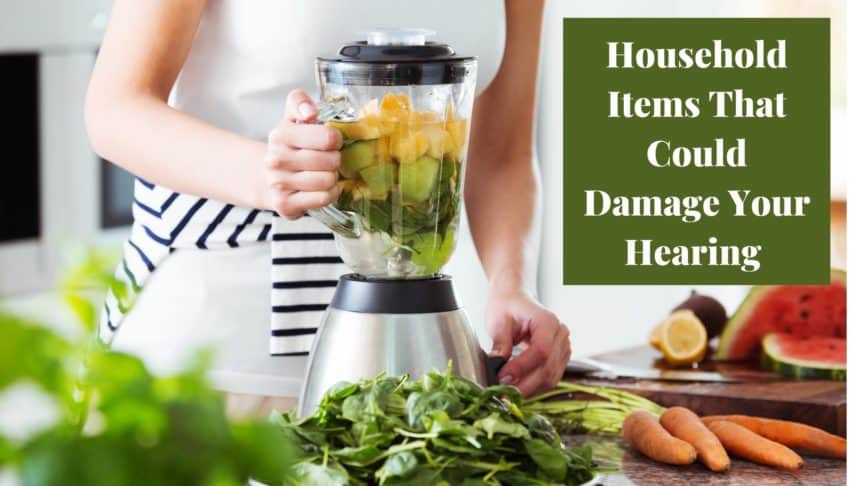A major misconception about hearing loss is that it is caused by aging, only impacting older adults. But hearing loss actually affects people of all ages and it can be developed at any time. One of the most common causes of impaired hearing is exposure to loud noise. Known as noise-induced hearing loss, this is caused by one time or consistent absorption of higher volumes of sound. We are exposed to a range of sounds in our daily lives from the moment we wake up – alarm clocks to commuting, listening to music, having conversations, and using household items. In fact, the World Health Organization estimates that over 1 billion teens and young adults are at risk of developing hearing loss due to loud noise. Being aware of the everyday items and ways your hearing is being stretched is a great way to reduce your risk of developing hearing loss.
How Loud is Too Loud?
So what exactly is too much noise? Well, sound is measured in units referred to as decibels and noise above 85dB can be hazardous for hearing health. This is the equivalent of busy city traffic or a noisy restaurant. Experts suggest that exposure to noise at 85dB for 8 hours in one day is the limit for safe listening. According to the Occupational Health and Safety Administration (OHSA) guidelines for hearing safety, exposure time should be cut in half for every 3 decibel increase of sound after 85dB:
- 85dB: 8 hours
- 88dB: 4 hours
- 91dB: 2 hours
- 94dB: 30min
Exposure time beyond this can cause irreparable damage in the inner ear. Loud noise can damage the hair cells in the cochlear which are integral to how we hear and process sound. These sensory cells translate incoming soundwaves into electrical signals that get sent to the brain. The brain is then able to assign meaning to these signals which is what allows us to understand what we hear. Loud noise can cause hair cells to lose sensitivity, and over time these cells can die as a result. This prevents them from performing their essential function which produces hearing loss. Because these hair cells do not regenerate – humans are born with all the hair cells in the inner ear that we will ever have – any damage is permanent. There are also no medical interventions that can replenish these cells or correct the damage – resulting in chronic hearing loss.
Household Items that are Hazardous for Hearing
There are numerous household items that generate noise that exceeds 85dB. Being aware of daily hazards to your hearing health can help you adjust your exposure time which can significantly reduce your risk of developing hearing loss. A few of these household items includes the following:
- Appliances: there are several appliances that reach 85dB and beyond. This includes: a vacuum cleaner and lawn mower which can reach up to 90dB, blenders/juicers/food processors can reach 100dB, hair dryers can also reach 90dB.
- Power tools: other types of household appliances that can be hazardous for hearing health are power tools. On average, the power drill can reach 100dB, chainsaw can reach 110dB
- Headphones/Earbuds: using headphones or earbuds is a common way we listen to audio. Whether it’s music or podcasts, these devices have become integrated in how we live. Headphones and earbuds, depending on the specific type, can reach up to 100dB on the highest volume setting!
These everyday items can affect hearing and contribute to hearing loss. It is important to practice safety measures and ways to protect your hearing health.
Tips to Protect Hearing Health
The great news is that noise-induced hearing loss is totally preventable. There are simple and effective ways you can mitigate exposure to and impact of loud noise. A few safety measures you can start integrating include:
- Wear Hearing Protection. This can include headphones, earplugs, and earmuffs which offer a protective barrier for the ears, reducing the amount and impact of loud noise that is absorbed.
- Reduce Exposure. There are various ways you can reduce your exposure to loud noise including maintaining lower volume settings on devices, avoiding environments with loud noise during peak hours, taking alternate routes to avoid traffic etc.
- Take Listening Breaks. Implement listening breaks throughout the day where you are not exposed to sources of noise. This gives your ears and brain time to rest and recover from constantly processing sound throughout the day.
- Have Hearing Tested. Be sure to have your hearing tested regularly. This is a great way to be proactive about hearing health and track your hearing needs.
Contact us today to prioritize your hearing health. We can support you getting started by scheduling an appointment for a hearing consultation.

